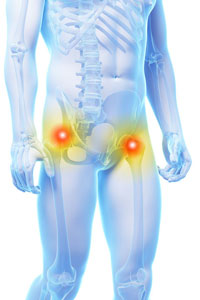 Arthritis injection therapies provide a safe and non-invasive alternative to surgery. With a proper and prompt diagnosis, the treatment of the affected area will typically allow most patients to resume normal activities and return to work in a relatively short period of time.
Arthritis injection therapies provide a safe and non-invasive alternative to surgery. With a proper and prompt diagnosis, the treatment of the affected area will typically allow most patients to resume normal activities and return to work in a relatively short period of time.
Most hip pain is caused by long term wear and tear on the joint. Over time, as the hip joint rubs back and forth, it wears down the cartilage that provides a buffer between the bones of the hip. Once the cartilage is worn down, the bones begin to rub against each other, causing pain which can become severe. However, strained muscles and tendons can also make for a sore hip, and fractures caused by falls or other trauma can also be quite painful.
While some hip pain can be managed on your own, there are some signs that you should seek a doctor’s attention immediately. For instance, sudden pain can indicate a serious injury, as can any type of fall or trauma. Obvious wounds, noises coming from the joint, and difficulty walking or moving your leg are all signs that you should seek medical care.
You may also want to consult a doctor about hip pain even if you do not have pain directly in your hips. For instance, the pain can sometimes manifest itself in the groin, buttocks, or thigh. Alternatively, hip pain can sometimes indicate a problem elsewhere in the body, because pain can sometimes travel to different areas and manifest itself there. Hip pain can range from mild to severe, may worsen when you walk or run, and may interfere with your ability to get around. Consulting a doctor is the best way to determine the cause of the pain and to get the treatment you need to restore function and alleviate your discomfort.




